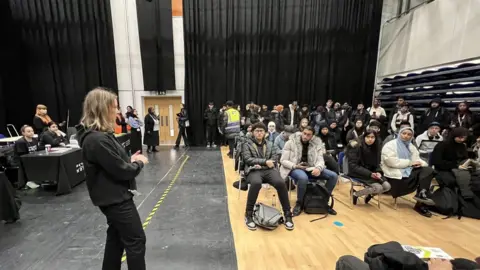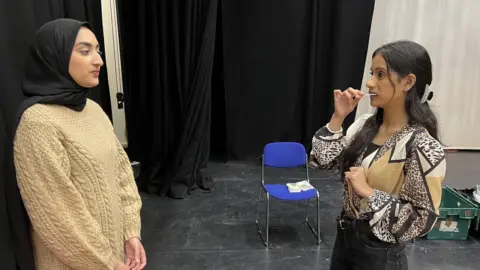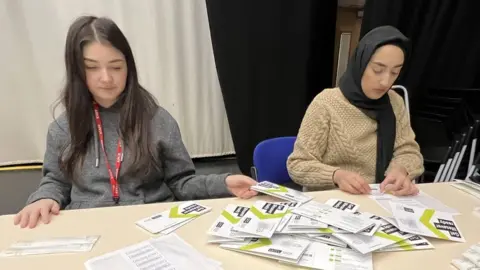Luton stem cell drive to boost diversity among donors
 Steve Hubbard/BBC
Steve Hubbard/BBCA town-wide recruitment drive to find more stem cell donors from different ethnic backgrounds is being held.
The campaign in Luton hopes to boost survival chances for blood cancer patients by creating a more diverse donor register.
Students are being asked to do a cheek swab at Luton Sixth Form College and the University of Bedfordshire.
"They could save somebody's life," said Alice Hirst of charity Anthony Nolan.
"For somebody with blood cancer the stem cell transplant is often their only chance," she added.
"They've had chemotherapy and it doesn't work and a stem cell transplant is the only thing that could save them."
 Steve Hubbard/BBC
Steve Hubbard/BBCAnthony Nolan said patients who were white had a 72% chance of finding the best match from an unrelated donor, which dropped to a 37% chance for patients from minority ethnic backgrounds.
Ms Hirst said a case in point was a young girl in Luton with Bangladeshi heritage who had been waiting almost three years for a stem cell donor because there was not a perfect match for her.
Luton is one of the most ethnically diverse areas of the UK, with "significant Pakistani, Bangladeshi, Indian, East European and African Caribbean communities", according to the council.
The 2021 Census recorded 54.8% of its population as non-white, making it one of four local authorities outside London where the majority of the population is from ethnic minority groups.
Councillor Javeria Hussain, chair of Luton Rising, said there were "simply not enough donors from ethnic backgrounds", adding: "We are appealing to young people to participate in the first UK town-wide stem cell recruitment drive and become a lifesaver."
Student Sehajkeerat, who volunteered to sign up, said: "God forbid it could happen to one of my family or even myself, so giving someone else the opportunity, I thought it was a great idea."
 Steve Hubbard/BBC
Steve Hubbard/BBCA stem cell transplant replaces damaged cells in the bone marrow with healthy ones and can be used to treat people with leukaemia and lymphoma.
If they are found to be a match for a patient, a donor is given injections to encourage the production of stem cells, which are then transferred to the patient.

Find BBC News: East of England on Facebook, Instagram and Twitter. If you have a story suggestion email [email protected]
